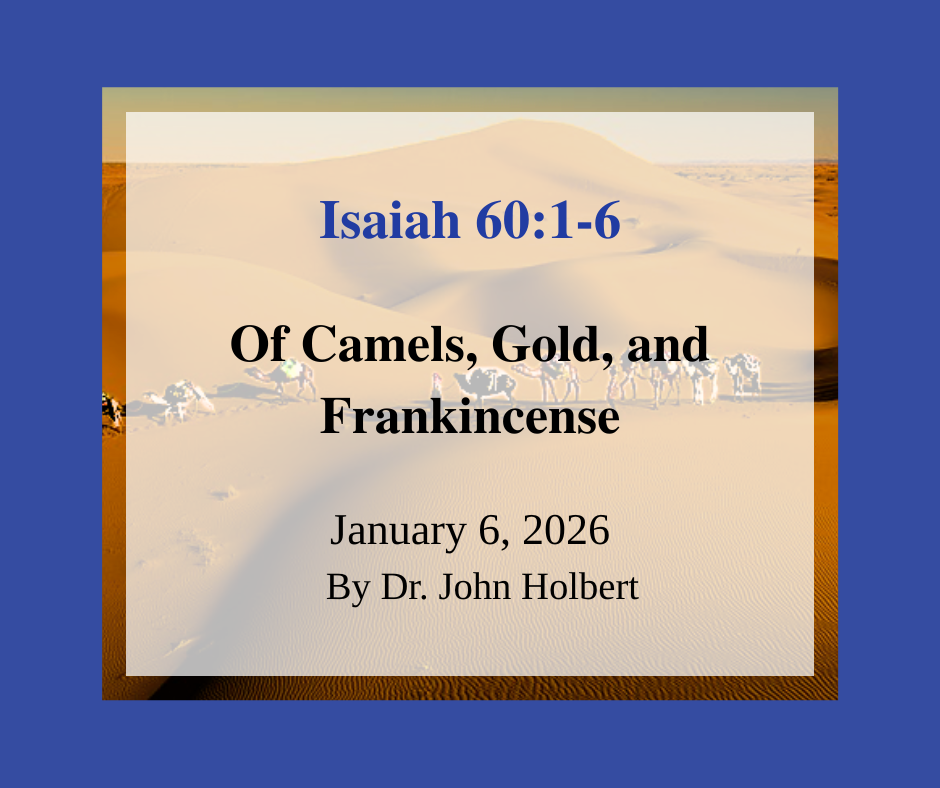Of Camels, Gold, and Frankincense - Reflections on Isaiah 60:1-6, Year A, Epiphany
by John C. Holbert on Friday, October 31, 2025

I realize that Epiphany this year does not fall on a Sunday, but I still feel moved to write essays on the two texts assigned for the day. You may or may not use them this year, but they are very traditional passages for the celebration, and you may find use for them in later years. The Hebrew Bible text is Is.60:1-6 which includes references to camels, gold, and frankincense, familiar items connected with the appearance of Jesus at Bethlehem, items that surely helped determine how Matthew composed his tale about the birth of the Messiah. Those three well-known gifts of the Magi are not the only features in this text that aided Matthew’s story.
The very first verse surely provided the necessary backdrop for the tale Matthew wove for the ages. “Stand up! Shine, because your light has come, and the glory of YHWH has risen upon you” (Is.60:1). The verb I translated “risen” comes from the word for “east” or the place of sunrise. Little wonder that Mt’s Magi come from “the east” to meet the child and to bring him particular gifts. “Darkness covers the earth,” warns Isaiah, but “YHWH will rise over you and God’s glory will appear over you” (Is.60:2). (When my singing voice was no longer capable of tenor work, it continued to deepen until I often sang that aria from Handel’s “Messiah” that reaches into the more cavernous part of a voice: “The people who walked in darkness,” first in a minor key and then changing to major as the light shines.)
In reality, this Isaiah text has no specific historical provenance, but it surely was written well after the 6th-century BCE exile of Israel, because the central theme is the return of God’s people from far away. “Lift up your eyes and look around you; all will gather together and come to you; your sons shall come from far away, and your daughters shall be carried in the arms of their nurses” (Is.60:4). These images are common in the post-exilic period of Judah’s existence, as the people, sometimes with the surprising help of their captors (see Is.45), began to wend their way back to their former home.
Not only will they return, says Isaiah, but they will not come empty-handed. “The sea’s vast abundance shall come to you, along with the wealth of the nations” (Is.60:5). This theme of the nations coming to Zion is regularly promised to the exiles to provide hope for a renewed life in the land of promise. When Israel makes its way back to its ancestral home, they will have the financial wherewithal to make a new start, says Isaiah. Of course, the reality was rather different for the returning Judeans. The did attempt a rebuilding of the temple in 515BCE or so, but its glory was nothing like its former wonder, at least according to several witnesses. Indeed, the struggle to gain a new life in Judah and Jerusalem was a long one, lasting several centuries, and interrupted first by the Greeks and then by the Romans, both of whom retained full power over the land, save a few occasions like the rebellion of the Maccabees in the 2nd-1st centuries BCE.
The three items named specifically: camels, gold, and frankincense each bear special significance for the ancient world. Camels were the most important part of the life of the traders who plied their tracks from North Africa to the edges of what we know as India and beyond. The camel’s extraordinary ability to carry heavy loads about seven days without the need for water changed the travel patterns of the Middle East forever; they were apparently domesticated about the 11th century BCE. This is why Isaiah mentions camels from Midian, Ephah, and Sheba. The latter two locations are hard to pinpoint, but Midian is clear enough, a place where camels were bred and employed both for commerce and warfare. A charging phalanx of several hundred braying and snorting camels must have been a terrifying sight!
Yet, here the camels are the beasts of burden, bringing gold and frankincense. The former’s value needs no explanation, appearing in fine jewelry and ornaments from the early days of the pharaohs of Egypt. Frankincense is a costly and deeply aromatic spice primarily coming from only one genus of tree, growing primarily in south Arabia and northern Somalia, hence its production and use were highly prized, thus making it an expensive substance. It was used in divine worship (Ex.30:34), its misuse even punishable by death (Ex.30:38)! In this text its appearance adds to the wealth and power of the returning exiles. When Matthew picks up these elements for his birth story, they resonate with the power and wealth that they have long had. Jesus, says Matthew, deserves nothing less!
